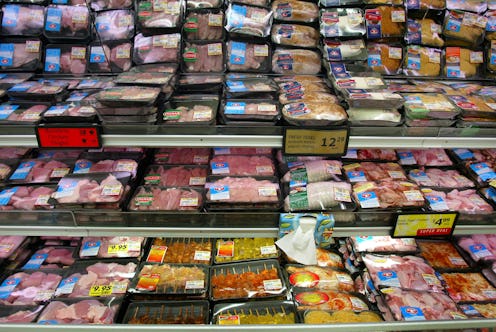News
Chicken Labeling? Meh, Says The USDA
Exactly how much do you trust your food? Some of us feel compelled to ask that every day, especially if you have food allergies, or conscience-driven dietary restrictions. But there's obviously an even bigger underlying question: is this food safe to eat? Is it healthy? Well, according to Wired, you can expect to start wondering that even more when you buy a piece of chicken from here on out — the USDA will allow sales of chicken processed in China with no label alerting consumers, a decision which has concerned health and sanitation advocates and, well, everybody else.
And yes, this is pretty terrible. China has suffered major, high-profile scandals regarding their meat processing practices lately, In particular, a Chinese meat facility was caught selling tainted meat to Yum! Brands, the enormous fast-food parent company that owns McDonalds and KFC.
At the time, the station Dragon TV revealed that the offending company, Shanghai Husi Food, was using a number of unsanitary practices in their factory — gloveless food-handling, workers mixing expired meat with fresher meat to conceal that it had spoiled, meat picked up off the floor and tossed back into the supply, dirty work environments, you name it. Shanghai Husi Food wasn't a standalone Chinese company, though, having been owned by a the OSI Group, based out of... Chicago.
There is a little bit of nuance to the USDA's permission, in that it only allows chickens that originated for the United States to be processed in China, then resold here with no labeling. In other words, the chicken has to be born under the Stars and Stripes. But of course, that fact does little to alleviate major sanitation concerns — considering recent history, a trans-pacific trip to China and a stay in a Chinese food processing plant could potentially present significant health and sanitation concerns, regardless of where the chicken started out.
But as Wired details, the Chinese-processed chicken evades the USDA's country of origin labeling rules (or COOL, for short), by means of that largely technical distinction.
Basically, this decision by the USDA is a boon to meat processors and sellers alike, while altering the potential health risks assumed by customers, who'd obviously have no clue where their chicken came from. In simplest terms, if there's a mandated label that gives a consumer additional information about a product, that means the information on it might make them less likely to buy, which is why major food companies seem so hell-bent on preventing it.
Though the implications for public health and wellness are quite different, this is echoed in the stateside battle over whether to label food containing genetically modified organisms, or GMOs, for short.
It'll be curious to see where things go from here, and whether this is an early indication of expanded Chinese meat importing on the horizon, but this much should be clear — food safety and quality control, however much your eyes might gloss over when you see a new headline, is a very important issue, and it deserves your attention.
Images: Getty Images (2)
